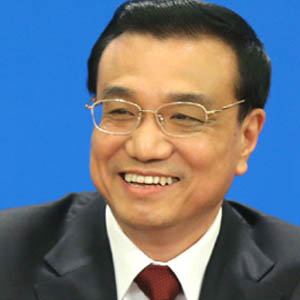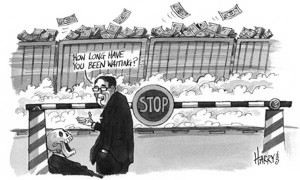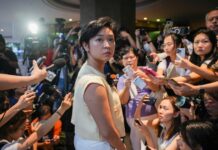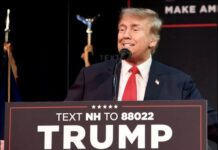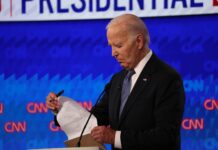At annual NPC-CPPCC meetings Xi Jinping and Li Keqiang talk of ‘painful’ reforms for economy, but rule out ‘Western models’
Vincent Kolo, chinaworker.info
China’s ‘two red carpet shows’ in early March, the NPC and CPPCC, put their seal on the one-party dictatorship’s once-in-a-decade leadership transition. A total of 5,000 ‘delegates’ came to Beijing for the annual gatherings of the largely ceremonial National People’s Congress (NPC), ostensibly China’s legislature, and its even more toothless ‘advisory’ body, the Chinese People’s Political Consultative Conference (CPPCC). These meetings are little more than a platform to announce policies already decided upon within the top circles of the Communist Party (CCP), where in secrecy the spoils from ruling the world’s most populous and fastest growing economy are carved up between powerful families, regions and ‘vested interests’.
Now known as the “billionaire congresses” (a Google search turns up 28,600,000 results for this), a record 83 billionaires were delegates this year, 31 billionaires at the NPC and 52 at the CPPCC. The average net worth of these 83 delegates is $3.35 billion according to the Shanghai-based Hurun list, compared with the average wage for urban workers of less than $7,000 per year. The richest NPC member is Zong Qinghou, chairman and CEO of China’s largest drinks company, Wahaha, with a $13 billion fortune. The richest US congressman, California Republican Darrell Issa, who is valued at $700 million, would only rank 40th richest as an NPC member.
The NPC meeting formally elevated (with one mysterious ‘no’ vote) CCP leader Xi Jinping to the presidency, replacing Hu Jintao, and installed Li Keqiang as premier, taking over the reins of the world’s second-largest economy from Wen Jiabao. These governmental titles are subordinate in the CCP political system to their respective party posts. November’s 18th CCP Congress placed Xi first, and Li second, in the seven-man politburo standing committee – the apex of power within the dictatorship.
For the first time in its history the CCP is led by princelings – descendants of Mao-era leaders – holding four of the seven standing committee seats under a princeling leader, Xi (the other three are anti-corruption boss Wang Qishan, new NPC chairman Zhang Dejiang, and new CPPCC chairman Yu Zhengsheng). Last year, Bloomberg reported Xi’s family fortune, from real estate and mining interests, to be worth $376 million. This is three times the wealth of the entire British cabinet with its 18 millionaires.
The consolidation of the princeling control over China’s party-state machinery reflects the decisive influence these elite families, popularly known as the ‘red aristocracy’, wield within government, the economy, and finance. But it also reflects the growing insecurity of the regime, which by stacking its leading body with princelings hopes to ward off pressure to dilute CCP political control. The princelings’ wealth and power is bound up inextricably with continued authoritarian rule and therefore, while they do not represent a consistent or unified political line, they are seen as the most steadfast defenders of the existing state.
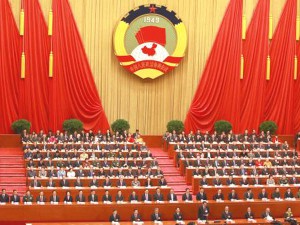
‘China Dream’
China’s media and propaganda machinery is abuzz with Xi’s signature slogan the ‘China Dream’, which again featured in his NPC speech. This replaces Hu Jintao’s worn and comical catchphrase of ‘harmonious development’. Xi’s motto is intentionally vague, playing to nationalism and “the great renaissance of the Chinese nation”, and to hopes for economic security especially for those in the cities who have achieved a precarious middle-class status – with home ownership, cars, and consumer habits. The urban middle class, an estimated one-tenth of the population (or roughly 140 million people), has become the main social base of the CCP regime – for the time being.
A media-generated ‘political honeymoon’ atmosphere surrounds the new leaders, an implicit recognition that the outgoing Hu-Wen team were a disappointment. They handover a much weakened regime, with its support base dangerously eroded, compared even to the one they took over in 2003. Wen, who received brief lukewarm applause for his final speech as premier, has been described by several commentators as a “tragic figure” who “could not even control his children” – a reference to newspaper reports last year showing his relatives had amassed a $2.7 billion fortune. Despite a decade of surging GDP growth rates, with a marked slowdown last year, the Xi-Li leadership inherits several potentially major crises including history’s biggest housing bubble, an explosion of underground banking, rising social discontent, sharpening inter-imperialist tensions and government corruption on a Himalayan scale.
The latter is a key plank of Xi’s new agenda; to strike hard at corruption – “both flies and tigers [high officials]” – which the new president admitted can threaten the CCP-state with “extinction”. But as on so many other issues, the policy changes are largely cosmetic – a new code of conduct to limit ostentatious displays of wealth by government officials and a ban on advertisements for luxury goods on state-run television (China has become the largest market for luxury goods, overtaking Japan).
Yet the main demand of political reform’ advocates, for a so-called sunshine law to force officials to disclose their property and investments, has so far not even been placed on the agenda. The decision to enact such a law was taken eight years ago, but immediately hit its head against reality – the CCP-state is so corrupt that systematically applying such a law could bring down the house.
“It is true that on one hand, fighting corruption is a good way to enhance the prestige and authority of the party, but it is also a double-edged sword because such legislation might damage the power of the ruling party,” Wang Changjiang, a department head at the Central Party School in Beijing told the South China Morning Post (10 March 2013). “The officials have to make sure the anti-corruption law will not damage the ruling party’s authority before it is launched. It’s a very complicated issue.”
So sensitive has the issue of a disclosure law become, that reporters were ordered by the CCP’s propaganda department not to table questions about this at the two meetings. “It shows the top leaders are again not willing to produce real results in fighting corruption, but just lavish us with words and few actions, as usual,” commented Zhang Ming, a professor at Renmin University.
As its wealth and global stature has grown, the Chinese dictatorship has become more sophisticated and media savvy. Xi’s ‘China Dream’ vision is clearly pirated from that most vacuous of political cultures, the United States, but with an authoritarian twist – to loyally follow the CCP.
But aside from a change of style, the Xi-Li leadership are signalling no major changes in political direction. The nature of the CCP-state, with its culture of secretive and protracted internal horse-trading and ‘consensus’, constrains the ability of government to shift direction. So-called ‘stability’ dominates official thinking. Above all on the issue of ‘political reform’ (relaxing authoritarian controls), despite the extremely cautious and gradualist approach advocated by China’s liberal reformers, the message from the NPC/CPPCC sessions is that this is off the table.
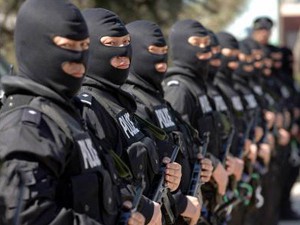
Maintain ‘stability’
Yu Zhengsheng, ranked 6th in the CCP hierarchy, said the regime would promote “consultative democracy” (i.e. today’s system) but completely rejects “extremist” demands to copy Western political systems.
“These [Yu’s] words are an admonishment to unrealistic fantasies at home and abroad… with the continued European debt crisis, the vigorous development of China’s economy has also made more people in the West see the value of the ‘China model’ [political system],” said the editor of People’s Daily Overseas edition, Zhang Hong, referring to praise from some Western commentators who see advantages in an authoritarian government for imposing crisis ‘solutions’.
Yu, known as a hardliner, was not alone in ruling out democratisation. None of the top leaders mentioned ‘political reform’ at the Beijing meetings and this included ex-premier Wen, who has previously been granted some leeway on this score (while never once translating his remarks into policy). In Wen’s 100-minute swansong speech to the NPC, the words ‘political reform’ were conspicuously missing. This reflects the consensus emerging around the new Xi-Li leadership: to advance economic reform (neo-liberal restructuring) but maintain ‘stability’ (undiluted one-party rule).
The outlook of the new leadership was summed up in a private speech made by Xi Jinping during his Deng Xiaoping-inspired tour of Guangdong in December; a speech widely leaked to the media at home and abroad. Referring to the collapse of the Soviet Union in the early 1990s, Xi told his audience this was because “no one was man enough to step forward and resist”. In this speech, Xi dismissed “Western universal values” and attributed the collapse of the Soviet Union to “calcium deficiency of the spirit” within its ruling group.
Clearly, Xi’s take on these events is extremely subjectivist and flawed. Crippled economically, the Stalinist dictatorship in the former USSR faced a mass movement for democratic change, which was tragically hi-jacked by capitalist elements within the old state bureaucracy, made possible by the absence of a working class and anti-capitalist alternative.
The new CCP leadership’s attempts to bolster one-party rule are likewise ultimately doomed to failure as growing demands for democratic rights converge with simmering discontent over house prices, corruption, extreme inequality and other economic ills. The CCP’s quavering and ultra-moderate liberals have a point when they warn that China faces revolution without some ‘democratic’ safety valves in the form of less censorship and repression. But, on its side, the dominant anti-reform group stubbornly clings to the undeniable fact that a lessening of authoritarian control can, as in the final years of the Soviet Union, open the floodgates of revolt. Either way, China is heading for revolutionary shocks.
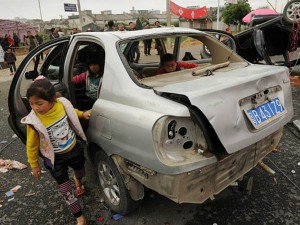
Shangpu crackdown
Actions always speak louder than words. For the third year in succession, the NPC endorsed an internal security budget (for police, spies, courts and prisons) that is bigger, at 769.1 billion yuan, than the military budget of 740.6 billion yuan. Putting this in perspective, at around US$124 billion, China’s internal security budget exceeds the GDP of more than 130 countries including Bangladesh, Iraq and Vietnam. Despite the ratcheting up of tensions with Japan especially, but also Vietnam and the Philippines over territorial disputes, the CCP sees its main enemy as social unrest on the home front. “A confident government that is not afraid of its population doesn’t need to have a budget for domestic security that is over defence spending,” commented Nicholas Bequelin of US-based Human Rights Watch.
An important development took place thousands of kilometres from the NPC, in the rebel village of Shangpu in Guangdong province. As we reported on socialistworld.net (http://www.socialistworld.net/doc/6200) a dispute over illegal land sales to a property tycoon saw locals involved in a tense standoff with village CCP officials and police. On Sunday 10 March, the sixth day of NPC proceedings, Shangpu was stormed by 2,000 paramilitary police using tear gas and stun grenades, dealing a savage blow to the protest movement. Over 40 locals including many elderly and women were hospitalised, causing disbelief and shock. One policeman posted pictures of himself online from the Shangpu warzone boasting: “Triumphant return, really exciting. Fired stun grenades and teargas.”
The brutal assault was timed and executed in order to send a signal not only to Shangpu but also to other rural revolts including Wukan, where a similar struggle one year ago gained some (largely unfulfilled) promises of concessions from the government. In Wukan, splits have emerged among the leaders of the protest movement, with some urging a new round of protests while others oppose this and warn of repression. The Financial Times (13 March 2013) correctly concluded, “Wukan example appears an aberration after brutality in Shangpu.”
These developments have generated enormous online debate. Many now see the ‘Wukan model’ of local elections as a failure, while others will conclude, as we socialists warned at the time, that CCP officials should not be trusted from whichever level of government. Wukan’s impressive protest movement should not have dissolved its independent popular structures but instead strengthened and fully democratised these, participating in the limited village election process to use this as a platform for continued struggle to demand real democratic rights, the return of stolen land and an end to the pro-capitalist policies of the CCP. This remains the way forward for this and many other struggles that will inevitably erupt.
Attack on Hong Kong “subversion”
At the same time in Beijing, two Hong Kong reporters were assaulted by security agents while trying to film an attempt by human rights activists to meet with Liu Xia, the wife of imprisoned Nobel laureate Liu Xiaobo. Liu Xia is under house arrest although she has never been charged or convicted of a crime. One of the Hong Kong reporters had his arm broken in the incident, which sparked protests by journalists and pro-democracy groups in Hong Kong.
Delivering a further stark warning to the people of the nominally autonomous city, Yu Zhengsheng told a closed meeting of CPPCC delegates that Hong Kong could not be allowed to “become a bridgehead for subversion” of China. These remarks, amplified by other CCP leaders, signal the regime’s resolve to again roll out anti-democratic security legislation under Article 23 of the Basic Law (Hong Kong’s constitution). They are also a warning that as yet unannounced rules for upcoming elections in 2017 and 2020, to be conducted for the first time through universal suffrage according to a longstanding but vague official pledge, will fall far short of mass expectations. CCP chiefs insist on mechanisms to exclude “unpatriotic” candidates or groups from winning government office. “There’s no difference at the top [of the CCP] regarding Tibet, Hong Kong and Taiwan; there are no liberals,” commented Hong Kong-based author Willy Lam.
This correct description of the new CCP leadership does not rule out cosmetic changes to win public approval. It is clear the incoming government hopes to build support with a number of eye-catching initiatives, perhaps including some relaxation (within limits) of the hated one-child policy.
Another example is the possible phasing out of the ‘laogai’ education-through-labour camps, a parallel penal system outside the control of China’s courts. While no concrete proposals were tabled for the NPC, despite contradictory and misleading media reports to this effect, it is likely the government will announce the formal abandonment of the system perhaps by the end of this year. Socialists would welcome this albeit small step, but we warn it will not fundamentally alter the workings of state repression. Chinese regions today make use of a vast network of extra-judicial black jails to deal with assorted ‘troublemakers’ and this is despite central government attempts to curb the practise. So while ‘laogai’ reform can help the Xi-Li leadership burnish its image regarding ‘rule of law’, it will not make a major difference at ground level.
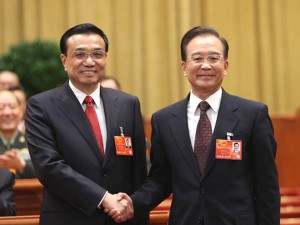
“Curbing government power”
While ruling out political ‘liberalisation’ the new leadership has clearly signalled its aim for a fresh wave of economic liberalisation. This is a calculated move to woo the capitalists, particularly overseas where China faces mounting protectionist pressures, with the prospect of new profitable openings for private capital in formerly ‘off limits’ sectors. Reflecting the positive feedback from international capital, Li’s speech offered a “tantalizing palette” in the words of the New York Times (17 March 2013).
The new urgent tone also reflects a consensus, albeit shaky, within the top echelons of the CCP-state that the current debt-driven, export-dependent growth model is reaching its limits. Economic reform – government-speak for neo-liberal pro-market policies – is the only alternative as far as the new leadership is concerned.
Just days into the job, Li Keqiang has already been given the title “reform-minded premier” by the Chinese media, and is widely likened to his forerunner, Zhu Rongji, who slashed state sector payrolls by half in the 1990s. Li’s department last year co-authored a major World Bank report (‘China 2030’) that calls for sweeping privatization, deregulation and downsizing of the state sector. Li’s new economic team includes former close associates of Zhu Rongji, including Ma Kai (vice premier), Luo Jiwei (finance minister) and Zhou Xiaochung (central bank chief). Zhou, is retained, despite reaching pension age, to oversee already started financial reforms such as market-based interest rates, “deepening” of financial markets, and internationalisation of the currency – to wean China away from its costly dollar dependency. All these ‘reforms’ can go spectacularly wrong, as we have explained in previous articles on chinaworker.info.
At his press conference on the final day of the NPC, speaking to 1,000 Chinese and foreign journalists, Li spelt out an aggressive agenda:
“Reforming is about curbing government power, it is a self-imposed revolution, it will require real sacrifice, and this will be painful and even feel like cutting one’s wrist.”
“Unchartered waters”
Responding to a reporter’s question, Li said, “You said that in pursuing reform we now have to navigate uncharted waters. We may also have to confront some protracted problems. This is because we will have to shake up vested interests… No matter how deep the water is, we’ll wade into it because we have no alternative.”
Premier Li’s watery metaphors build upon Deng Xiaoping’s famous adage of “crossing the river by feeling for stones”, and denote that a step-by-step approach is no longer enough. While Li gave few details, it is clear the new leaders are preparing a wave of attacks upon the working class and parts of the state-owned sector as the only way, from their standpoint, to save their system as the global capitalist crisis continues, deepens, and pulls China into its slipstream. To gain acceptance for his “painful” measures Li aims to mix in some populist touches – a verbal war against corruption and promise of “cleaner” government. Li vowed to slash government spending apart from on “key services” and shrink public sector payrolls. Measures will include a crackdown on junkets and government vehicles, and a freeze on new government buildings over the next five years.
The break-up of the Ministry of Railways, split into a new state-owned rail provider and a regulatory body merged under the Transport Ministry was one of the few concrete changes announced at the NPC. The old ministry had become synonymous with corruption and debt, with around a dozen top officials arrested in recent years. Liu Zhijun, the former minister, awaits a probable suspended death sentence for corruption.
The Xi-Li leadership is using the demise of the old ministry as a symbol for its new reform programme, while in practise the changes may not mean so much and have been mooted for years. With good reason, however, many in China fear rail fare increases and job cuts are imminent as a more market-based praxis is introduced. Premier Li announced that private capital would be encouraged in the rail, energy and financial sectors, previously state monopolies, and that the number of applications needing central government approval would be slashed by at least one-third.
Chinese ‘rebalancing’?
The dilemma facing the CCP regime is that it cannot continue on the old road, but the new road it has chosen is no less perilous. Ultimately, both roads lead to revolution. An interesting incident was reported by Italian journalist Francesco Sisci, which reveals the political physiognomy of China’s new leaders, in this case Xi Jinping:
“In 2010, in a closed door meeting between future-president Xi and Italy’s then-economy minister Giulio Tremonti, the Italian, probably for the sake of hospitality, praised the role of state intervention in the economy, which had stopped the spread of the US financial crisis in China. Xi, however, did not remain silent, and in fact did not seem to appreciate the compliment. He pointed out that when the crisis is over, the state must withdraw from the market and allow it to act freely according to market rules.”
The consensus within the CCP is that the heavy dependence on fixed-asset investment (into real estate, factories, roads and infrastructure) – currently an unprecedented 50 percent of GDP – must be reduced. This overinvestment has resulted in dangerous levels of debt, overbuilding and overcapacity. ‘Rebalancing’ towards consumer spending is seen as imperative by this government like its predecessor (which nevertheless failed utterly in this task).
The explosive growth of the shadow banking system, an eerie similarity with the pre-crash US, shows that the government is in a race against time. The Chinese economy is attempting to ‘solve’ its own problems, by routing more and more credit (45 percent of the total last year) outside of the government-regulated financial system, which involves the mass production of risky, uncontrolled and often fraudulent investment products.
But the government’s ‘rebalancing’ doctrine is fundamentally at odds with China’s current economic model as a cheap labour export-orientated economy. As Marx taught us, sweatshop wages do not support mass consumer spending. This helps to explain why household consumption in China has fallen, even as its economy has thundered ahead, to 34 percent of GDP. This compares to 57 percent in India and 59 percent in South Africa (World Bank figures, 2011). The labour theory of value explains why the “dragon of Chinese consumerism” remains a mere gecko, apart from that tenth of the population defined as middle class who can engage in consumerism.
To square this circle, the government has accepted the prodding of global capitalist agencies like the World Bank and IMF, to spend more on social welfare. In China only 38 percent of government spending is earmarked for education, healthcare and social security, compared to an average of 54 percent in other countries at a comparable income level. Rather than altruism, the World Bank-IMF position is that building a rudimentary welfare net, especially for 200 million migrant workers who lack any cover today, will boost consumer spending.
But attempting to increase social security provision has repeatedly run afoul of other structural obstacles within the Chinese system. Welfare outlays are mainly the responsibility of local governments, not Beijing, and these governments are now saddled with massive debts notched up during the 2009-10 stimulus package. Their financial difficulties are multiplying as land sales decline (by one quarter last year), robbing them of a key source of income. This is even before the property bubble has burst, which it will, and perhaps soon.
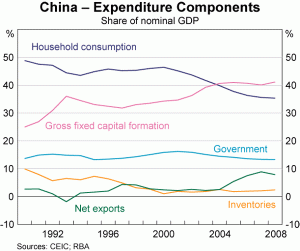
Reforming hukou
One incident tucked away in the detail of the NPC meeting underlines the huge challenge in enacting pro-consumption polices. A report commissioned by the NPC on reform of the half-century old ‘hukou’ (household registration) system failed to appear, a delay attributed to the issue’s “complexity”. Li Yang, the deputy president of the Chinese Academy of Social Sciences said, “Deeper research into this issue has revealed many problems”. Rather than scrapping altogether the system that divides citizens into a more privileged urban minority and a discriminated rural majority (numbering over 800 million), the central government favours a partial reform to speed up the assimilation of a layer of rural migrants into the city population, bringing them under the welfare umbrella that permanent city residence offers. Migrants with children must pay for schooling, for example, often of poor quality, as they are in most cases excluded from the public school system.
Reforming hukou has become bogged down by resistance from local and provincial governments who do not want to shoulder the extra budgetary costs – about 80,000 yuan (US$12,870) per person according to one estimate. Yet without this reform, the CCP leadership’s talk of urbanisation as the “backbone of a booming economy” is self-delusion. These realities led government advisors to warn the two meetings “urbanisation was not as easy to achieve as many had imagined,” reported the South Chin Morning Post (8 March, 2013). Former World Bank chief economist Lin Yifu, now a CPPCC Standing Committee member, cautioned against “over-urbanisation”, which he said could trap millions in unemployment and poverty.
Dream to nightmare
An additional motive for hukou reform is to achieve greater labour market and wage competition. The capitalists bemoan that labour productivity gains are slowing, from an annual average of 4.7 percent in 2001-07 to 2.8 percent in 2008-10 according to a report by Ernst & Young. At the same time, there is a growing labour shortage for prime age (20-24 year-old) factory workers, as China’s demographics shift and more young people go into higher education. This is pushing up manufacturing wages at a time when other low wage economies – Bangladesh, Vietnam, Indonesia – are gaining as destinations for foreign and Chinese investment.
The solution of the new leaders is a fresh assault on working class pay, retirement age, and the ‘vested interests’ of state sector employees, combined with new incentives for private capital. But as we have explained, an internal CCP consensus to launch economic ‘reforms’ does not automatically mean this will happen. This task largely eluded the Hu-Wen leadership, due to in-built contradictions in the current economic structure and also within the factionalised party-state relations.
The power struggle inside the CCP, which at the November congress produced the current princeling-dominated leadership, has not been laid to rest. The ousted and currently ‘disappeared’ princeling Bo Xilai can still present a massive problem for Xi’s government. The delay in bringing Bo to trial, amid rumours he has staged a hunger strike and refuses to go quietly, suggests extreme nervousness on the part of the government. There are also rumours that the main charge against Bo may change to ‘plotting a coup’ from previously reported allegations of corruption and abuse of power.
Xi is hailed as a ‘super balancer’ who has struck deals for and against both the main factions (allied respectively with ex-leaders Jiang Zemin and Hu Jintao) in order to consolidate his hold over the new government. While Li Keqiang is the sole representative of Hu’s ‘Youth League faction’ within the seven-man politburo standing committee, Xi has sought to check the influence of Jiang’s princeling-led ‘Shanghai faction’ by promoting Youth League figures to other prominent positions, notably Li Yuanchao, who was manoeuvred out of a standing committee seat by Jiang’s faction, but now becomes Xi’s vice president. This appointment “represents a comeback for the Communist Youth League and shows the power struggle is far from over,” commented Japan’s Asahi Shimbun (15 March 2013).
Xi’s purported balancing skills have yet to be tested in the explosive trials ahead. By again rejecting a political opening and even limited democratic reforms, the new leaders are under even greater pressure to deliver economic growth to feed Xi’s ‘China Dream’ mantra. But this in turn looks increasingly less likely as the current growth model chokes on mounting debt levels and overcapacity, while Premier Li’s neo-liberal alternative of pain, sacrifice and “slashed wrists” risks triggering massive resistance. Dream will turn to nightmare sure enough for the new government – the question is only how soon.

